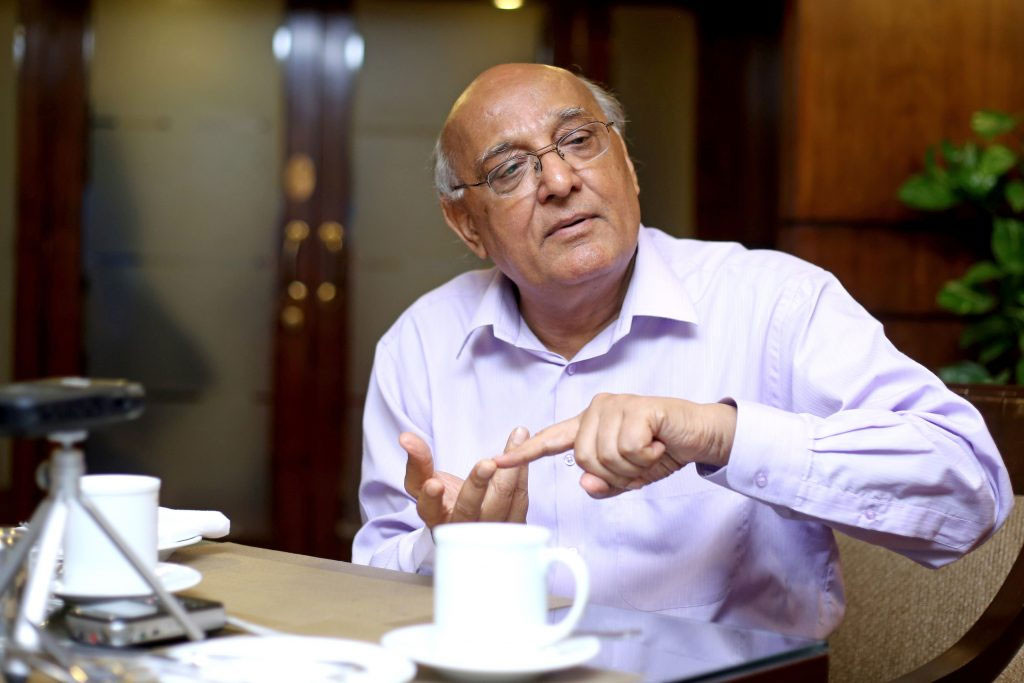[ad_1]
The year is 1979 when PTV aired the first episode of Amjad Islam Amjad’s popular 13-episode drama serial, Waris. The show revolves around feudalism, highlighting the story of the Chaudhrys, a feudal family fighting hard to retain its influence in the village of Sikandarpur. What many didn’t know was that Waris will go on to become one of the most career-defining plays in Amjad’s glittering career.
While his extensive work in Urdu literature and pop culture would always be remembered, Waris had always been a project close to his heart. In an interview with The Express Tribune’s T Magazine last year, Amjad spoke about his critically acclaimed show.

“My first television play was Aakhri Khawb, a telecast by the PTV Rawalpindi Centre in 1973. After that, I wrote two plays titled Mom ki Guria and Barzakh for the series Havva Key Naam, directed by Sahira Kazmi, in 1974. Rahat Kazmi acted in that one,” he said.
Amjad went on to add, “My first play for the PTV Lahore Centre was Khawb Jagtey Hain and it was presented on 23rd March 1975, the day I got married. That play won me the first Graduate Award. Since then, I have achieved 18 Graduate Awards and six PTV awards for best writer.”
Speaking about Waris, the renowned poet had shared, “My first TV serial was Waris, which was presented from October 1979 to February 1980, by the PTV Lahore Centre. That very play brought me great fame and popularity. Not only was it telecast twice on the national TV channel, but it has also even been translated into Chinese.”
Amjad went on to reveal whether Waris drew inspiration from his own life. He shared, “People often discuss this issue with me and most of them do not believe in the fact of my life that I have never been to a village as a resident throughout my life span. They believe that the meticulous handling of and command over this topic is proof that the writer has at least 20 years experience of living in a feudal society.”
He continued, “I was born in urban Lahore and never have had any personal or familial association with the feudal system or culture. But, right from my early life, I was quite conscious of and worried about social injustice and class discrimination. Moreover, the events and real-life stories in the society, around me, were reflective of our culture and these very factors paved the way for Waris, and the masses welcomed this with appreciation.”
Waris – a relevant piece of art
As the literary icon’s demise came as a shock to his admirers, many took to social media to reminisce about Amjad’s prowess. “I wish Waris is retelecasted so younger generations have an opportunity to watch what a writing talent he was. A tale of tradition, social change and regressive quixotic ideals – watch it today and it still has relevance,” a user shared.
Amjad Islam Amjad
Inna lillahi wa inna ilayhi raji’un
I wish Waris is retelecast so younger generations have an opportunity to watch what a writing talent he was. A tale of tradition, social change and regressive quixotic ideals – watch it today and it still has relevance. RIP pic.twitter.com/h7YV8UXhrf
— Fasi Zaka (@fasi_zaka) February 10, 2023
One more shared, “Waris was one of the all-time great dramas. An amazing tale of feudalism and nepotism trying to resist urbanisation and modernisation. Echoes of that still reverberate today. Rest in peace, Amjad Sahab and thanks for trying to make Pakistan a better place.”
Waris was one of the all time great dramas. An amazing tale of feudalism and nepotism trying to resist urbanization and modernization. Echoes of that still reverberate today. Rest in peace, Amjad Sahab and thanks for trying to make Pakistan a better place. https://t.co/UimABuc4N7
— Murtaza Syed (@murtazahsyed) February 10, 2023
Another tweep added, “Just learned that poet and dramatist Amjad Islam Amjad passed away. I haven’t read his poetry but I fondly remember his drama Waris, and especially the character of Chaudhary Hashmat, who was the inspiration for Genghis Khan in my novel Four Dervishes. Grateful to Amjad for creating memorable characters like Hashmat.”
Just learnt that poet and dramatist Amjad Islam Amjad passed away. I haven’t read his poetry but I fondly remember his drama Waris, and especially the character of Chaudhary Hashmat, who was the inspiration for Genghis Khan in my novel Four Dervishes. Grateful to Amjad for pic.twitter.com/6x9nvUCsWi
— Hammad H Rind حماد حسن رند (@HammadHRind) February 10, 2023
One more shared, “Saddened to know the demise of Amjad Islam Amjad. He will be remembered as a gentleman, a poet and an author of outstanding TV plays. Once the roads used to be empty when ‘ Waris’ was screened on TV. May the soul rest in peace.”
Saddened to know the demise of Amjad Islam Amjad. He will be remembered as a gentleman, a poet and an author of outstanding TV plays . Once the roads used to be empty when ‘ Waris’ was screened on TV. May the soul rest in peace آمین
— Ijaz Awan (@ijazawan56) February 10, 2023
Have something to add to the story? Share it in the comments below.
[ad_2]
Source link